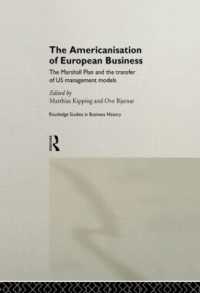- ホーム
- > 洋書
- > 英文書
- > Philosophy
Full Description
Sextus Empiricus was the voice of ancient Greek skepticism for posterity. His writings contain the most subtle and detailed versions of the ancient skeptical arguments known as Pyrrhonism, adding up to a distinctive philosophical approach. Instead of viewing philosophy as valuable because of the answers it gives to important questions, Sextus considered the search for answers itself to be fundamental and offered a philosophy centered on inquiry. Assuming the point of view of an active inquirer, Sextus developed arguments concerning conflicting appearances, infinite regress in argument, dogmatic assertion of premises that are insufficiently justified, and many other ideas that fascinated later philosophers of knowledge across the centuries. He provided a unique perspective on topics of enduring relevance such as perception, language, logical consequence, belief, ignorance, disagreement, and induction.
While Sextus's importance to epistemology was appreciated by early modern and modern philosophers, he is underrepresented in contemporary discussions. In order to put Sextus back in the center of epistemology, these essays discuss his influence in the history of modern philosophy as well as contemporary engagements with Sextus's version of Pyrrhonian skepticism. The contributors investigate epistemology after Sextus, addressing four core themes of Sextus's skepticism: appearances and perception, the structure of justification and proof, belief and ignorance, and ethics and action. The arguments presented here bridge the divide between contemporary and ancient debates about knowledge and skepticism and will appeal to philosophers interested in epistemology and philosophy of mind as well as those interested in ancient philosophy and the history of philosophy more generally.
Contents
Acknowledgments
About the Contributors
Justin Vlasits and Katja Maria Vogt, Introduction
Appearances and perception
1: John Morrison, Perceptual Relativism: Ancient and Contemporary
2: Kathrin Glüer, Illusory Looks
3: Megan Feeney and Susanna Schellenberg, Bayesian Liberalism
4: MGF Martin, Variation and Change in Appearances
5: Peter Pagin, The Force of Assumptions and Self-Attributions
The structure of justification and proof
6: Marko Malink, Hypothetical Syllogisms and Infinite Regress
7: Jessica N. Berry, Sextan Skepticism and the Rise and Fall of German Idealism
8: Duncan Pritchard, Wittgensteinian Epistemology, Epistemic Vertigo, and Pyrrhonian Skepticism
Belief and ignorance
9: Kathryn Tabb, "The Skeptical Physitian": Locke, Pyrrhonism, and the Case against Innate Ideas
10: Don Garrett, Pyrrhonian Skepticism and Humean Skepticism: Belief, Evidence, and Causal Power
11: Justin Vlasits, The First Riddle of Induction: Sextus Empiricus and the Formal Learning Theorists
12: Jens Haas and Katja Maria Vogt, Incomplete Ignorance
Ethics and action
13: Richard Bett, Echoes of Sextus Empiricus in Nietzsche?
14: Sergio Tenenbaum, Value Disagreement, Action, and Commitment
References
Index








